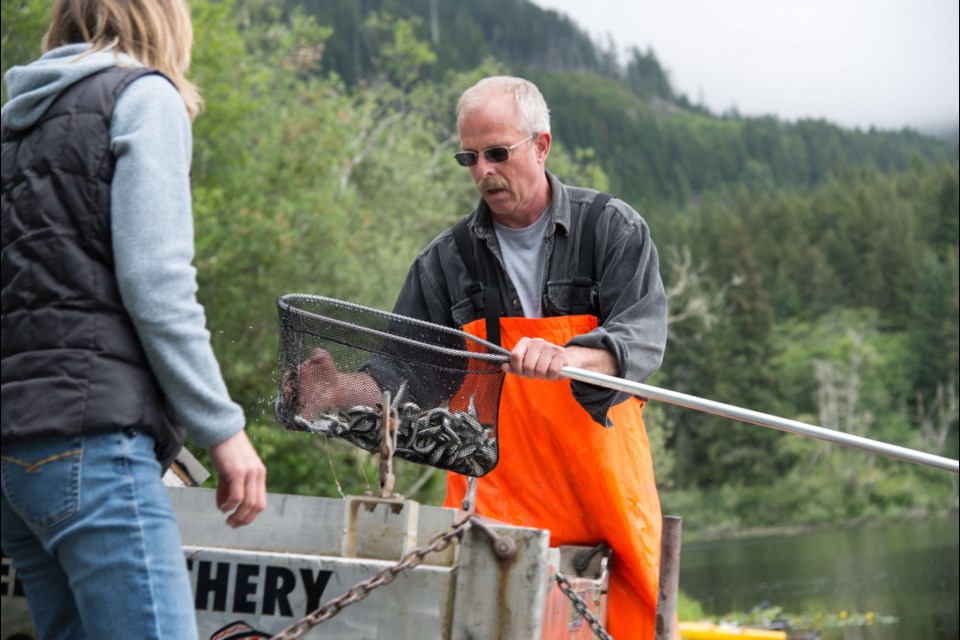Oak Bay sports fisherman Gord Allen loves the lure of the giant salmon catch. But he’s even more keen on the five-gram chinook fry that he’s pushing to bring back to the shelter of Greater Victoria waters.
Increasing the number of chinooks — the scarcest but most valuable salmon — wouldn’t just be a boon for recreational fishing. It would also replenish depleted stocks depended on by orcas, bears and eagles, along with commercial and First Nations fisheries.
As secretary of the Esquimalt Anglers’ Association, Allen is working with marine authorities in the hope of re-establishing netted pens full of wild chinook fry near Ogden Point. The shelter and feeding available in net pens allow the fry to double in size to about 10 grams over three weeks, boosting their chances of survival.
The Port Renfrew Salmon Enhancement Society has had success with the approach. It has released 250,000 chinook fry in the past decade, including 40,000 in June. The society has just announced a five-year program to mark and code at least 200,000 fry to document return rates.
“Every little pinky-size salmon had to be handled by a human being, so it was a lot of effort,” said Allen, who is also secretary-treasurer of the Port Renfrew group.
The net pens are not related to fish farms, in which Atlantic salmon are raised in contained pens and not released into open water, he said.
“By undertaking the net pen project, we are giving Mother Nature a little helping hand — to compensate, to some degree, for the degradation of the chinook salmon’s environment,” Allen said.
The fry are fed once daily by hand, then again with automatic feeders. About 25,000 fry can be held in a net that is nine metres square and seven metres deep.
Esquimalt harbour’s net pens were dismantled after the Sept. 11 attacks on the World Trade Centre towers because of security restrictions at the nearby Department of National Defence, Allen recalled. Preliminary paperwork has been sent to the Department of Fisheries and Oceans making the case for the use of local ocean waters for about three weeks per year to a depth of eight metres.
If and when nets will be installed is not known, said Ed Beatty, also of the Esquimalt Anglers. Chinook, also known as spring, king and tyee salmon, are more valuable than pink, coho, sockeye and chum, commercially and recreationally — and orcas struggling to survive in Puget Sound favour a diet of chinook, he said.
“We have an awful lot of volunteers that want to see this work,” Beatty said. “They’re willing to put in the time and assure DFO that this is not going to cost them anything.”
The survival of chinook fry from ocean net pens in Port Renfrew is two per cent — four times the usual survival rate that most hatcheries get, said society president Bob Gallaugher. Port Renfrew fishermen have the distinction of raising more San Juan chinook than they catch, he said.
DFO official Tom Rutherford praised the Port Renfrew effort. “It is projects like these that will help to ensure the sustainability of our salmon stocks into the future,” he said in a statement.
Salmon enhancement offers a legacy “far more important to the environment than human beings will ever be,” said Grant MacPherson of the Sidney anglers. Its members released 24,000 coho fry in July from the James Island dock near Lochside Drive in partnership with the Tsawout First Nation.
So few adult chinooks have returned to the Cowichan and Goldstream rivers in the past three years that they’ve been unable to get local chinook fry to stock net pens.
“The availability we had was coho, so that’s why were doing coho,” MacPherson said.
Returning salmon — fish spend an average of three to four years in the ocean before returning to the streams they came from to spawn — have an enormous ecological benefit. Even large trees anchored in shallow soil require the minerals found in salmon carcasses, not to mention animals such as bears.
“By feeding on those carcasses and carrying them farther and farther into the forest, they’re fertilizing and passing that nitrogen on to those trees,” MacPherson said.
“Salmon are such an important keystone species. Without them, we don’t have the trees, the whales, the seals, the otters.”



